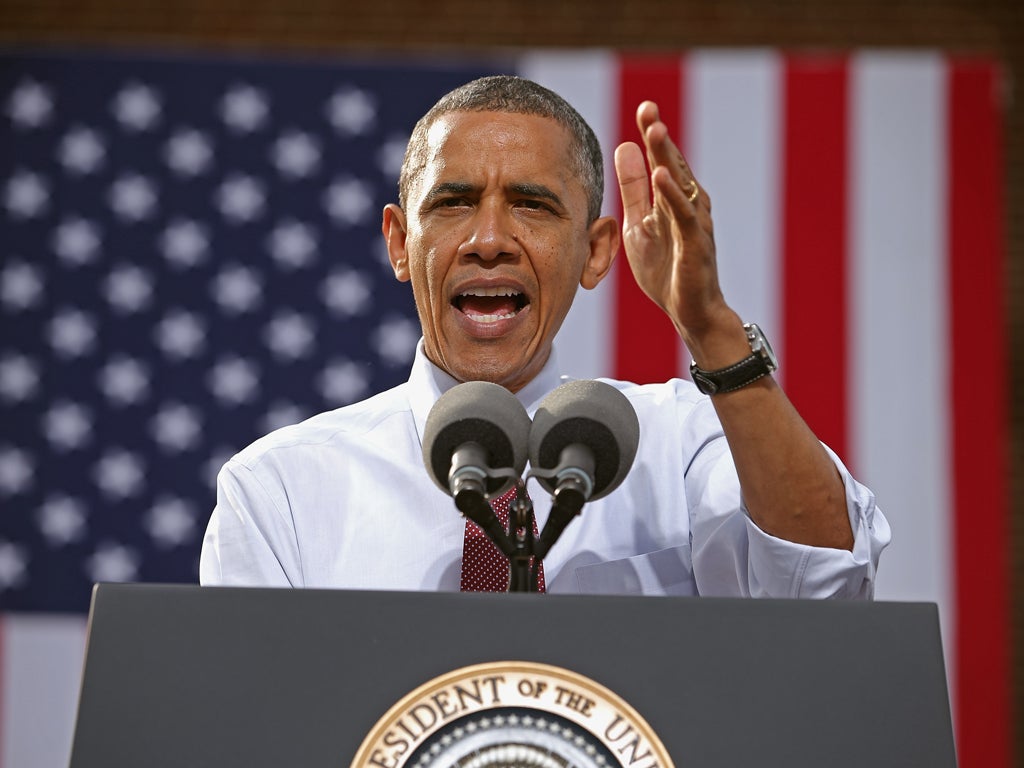Obama might win. So might Romney. But whatever the result next week, it's none of our business
It's unimaginable that Americans would invest as much emotion and energy in our elections as we do in theirs. Why do we delude ourselves that they care?

Your support helps us to tell the story
From reproductive rights to climate change to Big Tech, The Independent is on the ground when the story is developing. Whether it's investigating the financials of Elon Musk's pro-Trump PAC or producing our latest documentary, 'The A Word', which shines a light on the American women fighting for reproductive rights, we know how important it is to parse out the facts from the messaging.
At such a critical moment in US history, we need reporters on the ground. Your donation allows us to keep sending journalists to speak to both sides of the story.
The Independent is trusted by Americans across the entire political spectrum. And unlike many other quality news outlets, we choose not to lock Americans out of our reporting and analysis with paywalls. We believe quality journalism should be available to everyone, paid for by those who can afford it.
Your support makes all the difference.Many political activists from across the spectrum in the UK are this month in the United States campaigning for one candidate or another. This is an integral, if bizarre, part of modern political activism. British individuals, with no vote, who pay no US tax, do not live in the US, and are not subject to American laws, are knocking on American doors lobbying Americans to vote for their choice of candidate.
Imagine the shock if you opened your door during an election, to be told by an enthusiastic young person, who’d flown in from France or China, to change your vote based on their opinion of our politics. There would be mass outrage. It’s easy to see why Brits – or the British political class – are so infatuated with American politics. It has the drama, schmaltz and showbiz that British elections lack. Although we famously don’t like it when British politicians try to emulate the American political style, we love to follow the ins and outs of American elections on a minute level.
Bias
Recent polling in several European countries reflects a strong bias toward one candidate in particular. According to a Gallup International poll, 97% of Germans, 96% of the Irish, and 95% of the French approve of President Obama. That compares to Obama’s 44% approval in the US. Whose opinion matters more – the people of America, who experience life in their country in a way only they can, and who are subject to American laws and American taxes? Or the Germans, French and Brits, whose opinions are formed mainly from their armchairs?
Perhaps unsurprisingly for a continent that values its state handouts, there is a particular dislike of Republican candidates and presidents in Europe. But what business is it of ours to decide who would be the best man or woman to lead a democratic nation, in which we neither live nor have a vote? Of course, the American president has influence on world affairs, but the band within which there is any differentiation depending on who lives in the White House, is pretty narrow. Minus one or two wars here or there, most American presidents lead their nation on the world stage in fairly similar ways. No president wants to preside over a decline of American power on the world stage.
The president is simply a figurehead of a very pervasive culture. America’s influence comes from the innovation of its entrepreneurs, its film, music, lifestyle, values and the products it exports. The world around us is an American creation; think of any important element of modern life – the brands, foods and technologies we use, the culture we enjoy – and you’ll see where America’s power truly lies.
Main Street, not Marseille
The 2012 election could produce a win for either Romney or Obama. It is close in a way I can’t remember. Come January 21, President Romney or President Obama will face the same geopolitical questions: will the West allow Iran to go nuclear? Will Israel-Palestine ever be settled? Should American assets be used to stop the bloodshed in Syria? Come January 21, President Romney or President Obama will face the same burning desire to be isolationist and focus on re-inflating the American domestic economy.
The foreign policy debate – the final of the three debates – highlighted the very slight foreign policy difference between the candidates. It also previewed a coming insularity caused by the great economic slump. Come January 21, do you really think the man on the street in Middlesbrough, Marseille or Milan will notice the difference? I suspect not.
Join our commenting forum
Join thought-provoking conversations, follow other Independent readers and see their replies
Comments